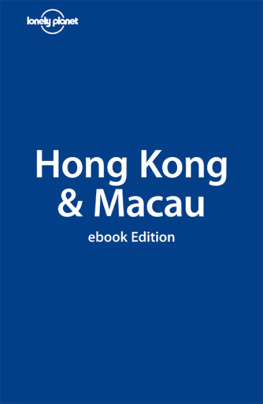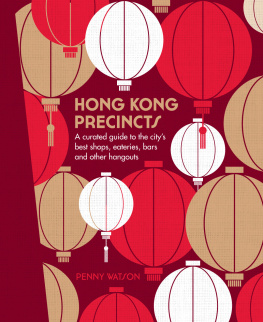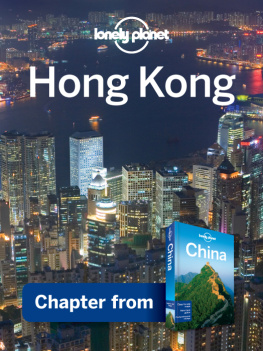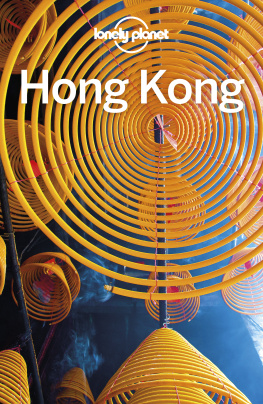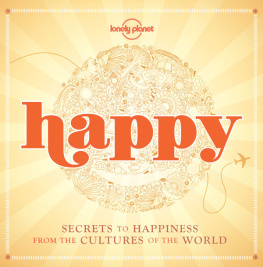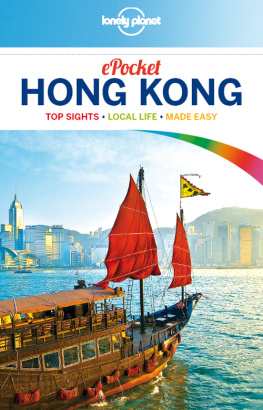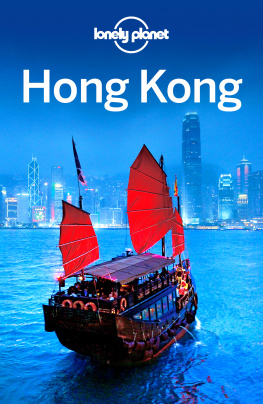THE AUTHORS
Andrew Stone
Andrew lived in Hong Kong for a magical year and a half in 2000 and 2001 writing as a freelancer about Hong Kong and the wider region. He made his home on sleepy Lamma Island and has returned every year since to research magazine articles and guidebooks, including the previous edition of this guide and the 2nd edition of Lonely Planets Hong Kong Encounter. Andrew updated the Neighbourhoods & Islands, Shopping, Entertainment, Directory and Transport chapters.
ANDREWS TOP HONG KONG DAY
The day begins with laps of the Four Seasons pool ( for a reminder of the best of Hong Kong, and for coauthor Pieras top food picks (I like to think at least two meals ahead).
Then its a toss-up between a dim sum breakfast amid the cheerful clatter of City Hall Maxims Palace () to go. I go for the dim sum, of course.
I board the Peak Tram for the cool breezes and stirring views of the Peak (), before stepping into thick jungle on the walk through Pok Fu Lam Country Park.
Whistling for a cab, I pop into Ocean Park ().
Evening is falling, so I hop on the Star Ferry ().
Time to get serious about food now, and I opt for Hang Zhou () and start a bar crawl west towards Soho, and then bed.
Piera Chen
Born and raised in Hong Kong, Piera studied English at Pomona College and works as a writer and editor in her hometown. She thoroughly enjoyed exploring the various manifestations of Hong Kongs eclectic culture for this, her first Lonely Planet commission. She wrote
the Background, Eating and Sleeping chapters, and the Ann Hui and Kenny Chan interviews in the Meet the Locals chapter.
Chung Wah Chow
Chung Wah, a Hong Kong native and freelance writer, wrote the Macau and Day Trips & Excursions chapters. She has travelled extensively in China and elsewhere and coauthored Lonely Planets China guide. Chung Wah loves visiting Macau to explore Macanese culture and cuisine. She is also an amateur dim sum connoisseur.
LONELY PLANET AUTHORS
Why is our travel information the best in the world? Its simple: our authors are passionate, dedicated travellers. They dont take freebies in exchange for positive coverage so you can be sure the advice youre given is impartial. They travel widely to all the popular spots, and off the beaten track. They dont research using just the internet or phone. They discover new places not included in any other guidebook. They personally visit thousands of hotels, restaurants, palaces, trails, galleries, temples and more. They speak with dozens of locals every day to make sure you get the kind of insider knowledge only a local could tell you. They take pride in getting all the details right, and in telling it how it is. Think you can do it? Find out how at lonelyplanet.com.
GETTING STARTED
Hong Kong is such a modern, well-run city that you wont need to do much practical pre-trip planning. You could pretty much rock up with a passport, a toothbrush and a credit card and get stuff done.
The transport infrastructure is excellent and runs like clockwork, its an incredibly safe city, English is widely spoken and the signage is mostly in English too. This is also a city with a strong service ethic, so you name it buying clothes or toiletries, withdrawing cash, getting internet access, doing your laundry and it will be done swiftly and with a smile.
This leaves you to spend most of your pre-trip efforts on the fun things, such as checking out if any festivals are going on in town, booking ahead for the most popular restaurants, checking the local listings and deciding where to base yourself.
Perhaps the only practical thing worth spending a bit of planning time on is your accommodation (). Hotels are not cheap and at busy times, such as during exhibition season, rooms can fill up and rates soar. Doing your homework can make a real difference to your wallet and your comfort.
WHEN TO GO
Hong Kongs subtropical climate can make it a punishingly hot and humid destination during the summer months. June to mid-September when humidity soars is the hottest time. Summer is also typhoon season, when tropical storms sweep rain and high winds off the South China Sea.
Even in late spring and early autumn, wandering Hong Kongs streets can be warm work. The best time to go climate-wise is in early spring (March and April) or late autumn (October and November), when the days are generally warm, fresh and (wind direction and mainland smoke stacks permitting) the air often clearer.
Things can cool down a good deal in winter, when it can often be overcast (as opposed to merely smoggy) and temperatures may even feel chilly enough to don warmer layers.
FESTIVALS & EVENTS
No matter what the time of year, youre almost certain to find some colourful festival or event occurring in Hong Kong. For the most part exact dates vary from year to year, so if you want to time your visit to coincide with a particular event, check the website of the Hong Kong Tourism Board (.
Many Chinese red-letter days, both public holidays and privately observed affairs, go back hundreds, even thousands, of years and the true origins of some are often lost in the mists of time. Most but not all are celebrated in both Hong Kong and Macau. For festivals and events specific to Macau, see .
January
CHINESE NEW YEAR
Southern Chinas most important public holiday takes place in late January/early February and is welcomed by a huge international parade at Tamar (now the PLA Central Barracks) site along the waterfront between Central and Wan Chai.
HONG KONG CITY FRINGE FESTIVAL
www.hkfringe.com.hk
The Fringe Club () sponsors three weeks of eclectic performances both local and international between late January and early February.
February
HONG KONG ARTS FESTIVAL
www.hk.artsfestival.org
Hong Kongs most important cultural event is a month-long extravaganza of music, performing arts and exhibitions by hundreds of local and international artists.
HONG KONG MARATHON
www.hkmarathon.com
This major sporting event dating back to 1997 also includes a half-marathon and 10km race and attracts 30,000 participants.
SPRING LANTERN FESTIVAL
www.discoverhongkong.com/eng/events/chinese-festivals.html
A colourful lantern festival on the 15th day of the first moon (mid- to late February) marks the end of the New Year period and the day for lovers.
March
HONG KONG ARTWALK
www.hongkongartwalk.com
Some 40 galleries in Central, Soho and Sheung Wan throw open their doors on a weekday (usually Wednesday) from 6pm to midnight to expose their art, offer viewers snacks and drinks supplied by the areas restaurants and raise money for charity.
HONG KONG RUGBY WORLD CUP SEVENS
www.hksevens.com.hk
Hong Kongs premier sporting event, this seven-a-side tournament is held over three days at Hong Kong Stadium and attracts teams and spectators from all over the world.
April
HONG KONG INTERNATIONAL FILM FESTIVAL
www.hkiff.org.hk
This is a two-week extravaganza with screenings of more than 240 films from around the world.
BIRTHDAY OF TIN HAU
www.discoverhongkong.com/eng/events/chinese-festivals.html
A festival in late April/early May in honour of the patroness of fisherfolk and one of the territorys most popular goddesses; in Macau it is known as the A-Ma Festival.

